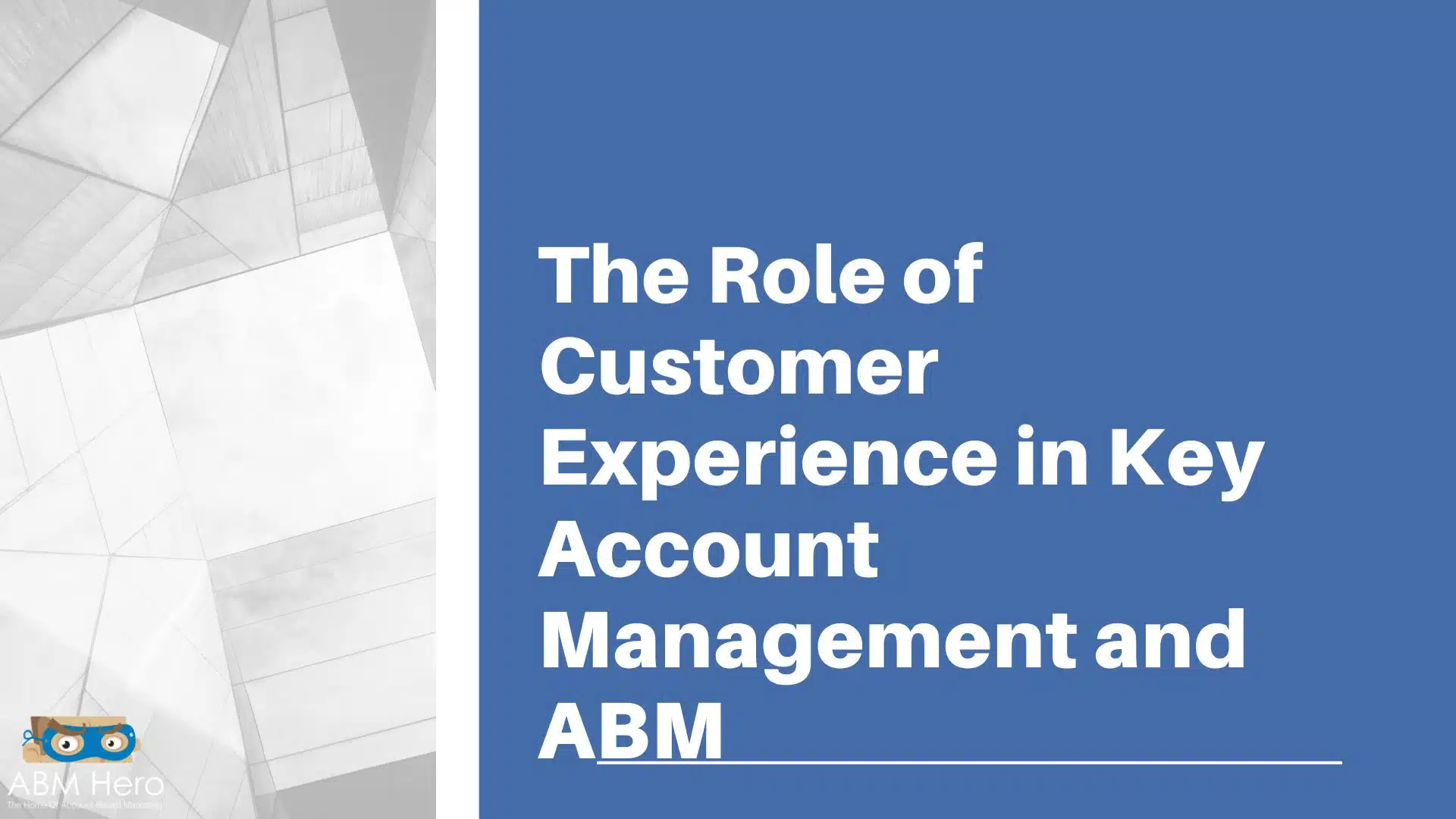Companies are no longer competing based on their products or services in today’s competitive business landscape.
They must also provide a remarkable customer experience to stay ahead of the competition.
This is particularly true in key account management and account-based marketing (ABM), where businesses must build long-term relationships with their high-value clients.
In this blog post, we will delve into the critical role that customer experience plays in key account management and ABM.
We will explore the benefits of providing a superior customer experience; the challenges companies face in achieving this, and some best practices for delivering exceptional customer experiences to your key accounts.
So, if you want to elevate your key account management and ABM game, keep reading!
What is Customer Experience?
Customer experience refers to how customers perceive their interactions with a company across multiple touchpoints throughout the customer journey. It includes product quality, customer service, and overall brand perception.
In the current business landscape, customer experience has become critical for companies to retain existing customers and acquire new ones successfully.
In Account-Based Marketing (ABM), which focuses on building strategic relationships with key accounts, customer experience takes on even more significance.
Effective key account management in ABM requires a deep understanding of each customer’s unique needs and preferences so that they can be tailored to receive an exceptional customer experience.
This personalized approach strengthens the relationship between the account and the supplier, increasing customer loyalty, higher revenue, and improved profitability.
One benefit of ABM is that it enables a more holistic view of the customer experience beyond just selling products or services.
What Makes a Good Customer Experience?
A good customer experience is multifaceted and can be influenced by various factors.
At its core, it involves meeting customers’ needs and expectations in a manner that is efficient, effective, and engaging.
This requires a deep understanding of the customer journey, from initial awareness through post-purchase follow-up.
A vital component of a good customer experience is personalization. Customers expect companies to understand their unique wants and needs and cater to them accordingly.
This can involve tailoring product recommendations, offering customized promotions, or providing personalized support.
Another crucial factor is communication. Companies that provide clear, concise, and timely communication with their customers are likelier to foster trust and build long-term relationships.
This can involve proactive updates on order status or proactive outreach to resolve potential issues before they become problems.
Finally, convenience is paramount. Customers expect to be able to easily find and purchase products or services online or in-store with minimal hassle.
Strengthens Relationships with Customers
A strong relationship between an organization and its customers requires a positive customer experience.
A good customer experience is one where the customer feels valued, heard, respected, and satisfied with the product or service they received.
It helps build stronger customer relationships as it fosters trust and loyalty.
Customers are more inclined to become repeat customers and even recommend the company to others.
The experience can be even more memorable when it exceeds expectations. Meeting or exceeding expectations requires a thorough understanding of the customer’s needs and wants and how the business can deliver these.
This understanding is gained by feedback from customers, whether positive or negative.
Solving customer grievances and responding promptly to their inquiries can create a deeper bond between the company and its customers.
Customers who have had good experiences with a company are often willing to pay more for their products or services because they feel they are receiving added value.
Overall, a good customer experience is essential for companies that want to sustain long-term customer relationships.
Improves Customer Loyalty
In Account-Based Marketing (ABM), managing key accounts is critical in driving customer loyalty.
When managing key accounts in ABM, meeting certain conditions improves customer loyalty through a good customer experience. Firstly, view customer experience as a strategic opportunity to build relationships with key accounts.
It means going beyond just providing customer support or resolving issues but also ensuring that the overall experience is positive, consistent, and tailored to the specific needs of each account.

Secondly, continuously track and analyze customer loyalty through metrics such as net promoter scores, repeat purchases, or referrals to understand the impact of customer experience on loyalty.
If these metrics increase over time, a good customer experience contributes to customer loyalty.
Lastly, the overall ABM strategy should integrate a good customer experience.
This means aligning sales, marketing, and service teams to deliver a seamless experience across all touchpoints with key accounts.
Increases Customer Satisfaction
Customer satisfaction is integral to the success of any business. One key factor that has been linked to heightened customer satisfaction is the provision of a good customer experience by key accounts managers.
This is because good customer experience involves personalized communication, prompt feedback, and efficient resolution of complaints by a company’s key accounts managers.
The reasons why customer satisfaction increases when key accounts managers provide good customer experience can be attributed to the concept of social exchange theory.
This theory posits that people engage in social interactions that entail a mutual exchange of tangible or intangible resources.
Key accounts managers who provide good customer experience create positive emotional ties between customers and the company by providing valuable resources to them.
Moreover, psychological studies demonstrate that positive interactions with service providers can enhance customers’ perception of service quality, ultimately increasing satisfaction.
In this regard, customers tend to feel valued and appreciated when their concerns are addressed in a timely and effective manner by key accounts managers. As a result, they are more likely to remain loyal to the brand.
Helps Drive Sales
In the realm of key account management, customer satisfaction has been identified as a key driver of sales.
This can be attributed to several factors, which include the potential for repeat business, positive word-of-mouth advertising, and increased loyalty.
Satisfied customers have been shown to be more likely to return for future purchases, and are also more likely to recommend a product or service to others. This not only increases sales but also expands the customer base.
Additionally, customer satisfaction is closely associated with increased loyalty, which can lead to greater revenue over time as customers become more invested in a particular brand or company.
In this way, key account managers who prioritize customer satisfaction are likely to see significant benefits in terms of sales growth and long-term business success.
In the long run, satisfied customers tend to be less likely to switch to competitors, which provides a key advantage in a highly competitive marketplace.
Enhances Customer Service Quality
A good customer experience plays a pivotal role in enhancing the customer service quality of a B2B company.
It is a well-established fact that customer experience is the sum total of all the interactions that a customer has with a company, and the emotions they feel during those interactions.
When a B2B company delivers a good customer experience, it not only satisfies the customer’s needs but also creates an emotional connection between the customer and the company.
The emotional connection created by a good customer experience drives customer loyalty and creates a positive image of the company in customers’ minds.
This results in repeat business and word-of-mouth referrals, which are necessary for the long-term success of any B2B company.
To deliver a good customer experience, B2B companies must focus on understanding their customer’s needs, providing personalized solutions, and ensuring consistent communication throughout the customer journey.
Furthermore, companies need to invest in customer support systems that provide timely and efficient service to customers.
In conclusion, it is evident that customer experience plays a crucial role in successful key account management and ABM strategies.
Customer-centricity, active communication, and personalized interactions are the pillars of effective customer experience.
By prioritizing customer experience, companies can strengthen their relationships with key accounts, increase retention and drive growth in their ABM programs.
So, it’s high time for account managers and marketers to embrace customer experience as a key factor in their strategic planning and execution.
By doing so, they can unlock the true potential of their key accounts and drive sustainable growth for their businesses.





